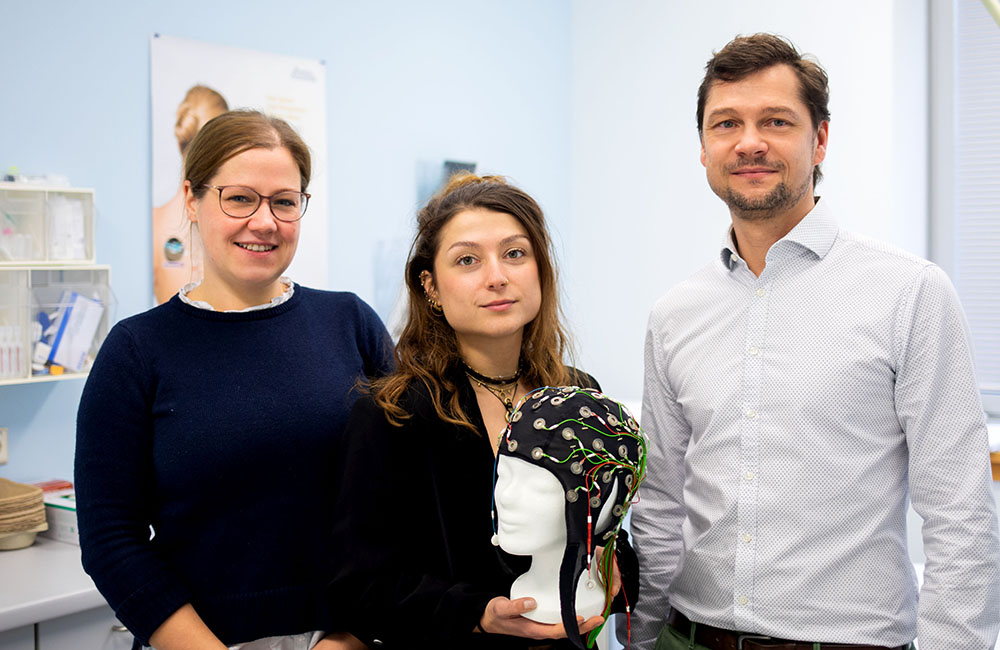Long-COVID: Study investigates therapeutic option for chronic fatigue syndrome
The Department of Neuropsychology at the University Department of Neurology at Otto von Guericke University Magdeburg is looking for people suffering from Long-COVID-related stress-induced exhaustion, also called fatigue, for a study. The study will investigate the effects of transcranial direct current stimulation (tDCS) as a treatment method. tDCS is a non-invasive electrical stimulation in which a weak current is applied to the surface of the head. The aim of the study is to establish a treatment method for fatigue and to gain a better understanding of Long-COVID, fatigue and the underlying factors.
After a corona infection, health impairments may occur for a longer period of time. These subsequent complaints are referred to as Long-COVID or Post-COVID. The most common symptoms are fatigue, concentration and memory problems, and breathing difficulties. Clinic Director Prof. Aiden Haghikia, MD, explains: "Fatigue also occurs in other diseases such as multiple sclerosis (MS) and Parkinson's disease, but also after strokes and cancer. Although many sufferers have a high level of suffering and fatigue is one of the most common reasons for retirement, there is still no effective treatment method across diseases." The causes and mechanisms of this so-called multi-system disease have hardly been researched to date, according to working group leader Prof. Dr. phil. Tino Zähle, the causes and mechanisms of this so-called multi-system disease have hardly been researched so far, but have gained new attention through Long-COVID. A large part of the fatigue research has so far been carried out on MS patients. "Here, positive results have already been achieved with the help of tDCS, so that we also expect a positive effect of tDCS on the cognitive fatigue of our test persons with Long-COVID-related fatigue," explains Prof. Zähle. The study will now provide verifiable data.
Photo: The research team (from left): M. Sc. Stefanie Linnhoff, study leader Magdalena Mischke and Prof. Dr. phil. Tino Zähle, working group leader of the Department of Neuropsychology at the University Department of Neurology at Otto von Guericke University Magdeburg. Photographer: Sarah Kossmann/UMMD
The study includes a total of four stimulation appointments over a period of 14 days, accompanied by two EEG measurements in preparation for and after completion of the stimulation, interviews, a blood test, and another examination appointment four weeks after completion of the treatment.
Research on fatigue is generally challenging. A specific blood test or a clear biomarker that can be detected in a blood test does not yet exist. Study leader Magdalena Mischke explains: "In the classification and measurement of fatigue, usually only subjective feelings are collected by means of questionnaires. We would also like to record objectively measurable fatigue-associated behavioral and EEG parameters. Thus, in addition to self-assessments, objective electrophysiological markers will also be included in the analysis. We hope to be able to achieve a long-lasting effect with the multiple stimulation and to learn more about the disease mechanisms of long-COVID-related fatigue via inflammation-associated blood parameters in order to conduct more targeted research into treatment methods in the future."
Neuropsychologist Zähle adds: "If effectiveness can be proven, people with fatigue can be given a method with few side effects to alleviate their symptoms. In addition, similar to multiple sclerosis and other neurological diseases, an effectiveness of tDCS in long-COVID would provide evidence to consider fatigue as a transdiagnostic syndrome and not only to explore it in isolation as a syndrome of a specific clinical picture."
Contact for prospective students: Magdalena Mischke, Director of Studies, University Department of Neurology of the Otto-von-Guericke-Universität Magdeburg, Telefon: +49-391-67-21683,






